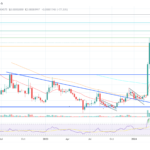[ad_1]
Impaakt, a Swiss startup, has launched a comprehensive corporate rating service that looks at a wide range of a firm’s impact across metrics such as job creation, carbon footprint and board diversity.
It seeks to disrupt the ESG industry which has been widely criticized for oddities such as giving large oil industry polluters favorable rankings while giving a low score to Tesla.
Wind and solar companies got good ratings from Impaakt. (Photo by David McNew/Getty Images)
Critics have complained about a lack of transparency and consistency across firms, such as S&P, that provide ESG ratings. Impaakt provides a detailed explanation of its ratings, which are developed by over 600 analysts and then submitted to 50,000 volunteer raters for their evaluation and scoring.
Its report has been downloaded hundreds of times by corporations, financial institutions and individuals, said Ben Robinson, co-founder of Aperture, a fintech analytics firm based in Geneva which is also an investor in Impaakt.
Bertrand Gacon, co-founder and CEO at Impaakt, has worked in sustainability and responsible investment for years at leading European commercial and private banks.
He said ESG is mis-used in judging how green a business is.
“That’s not what it was designed for, it was to measure the risk of investing in a company. ESG might address the environmental risk but it doesn’t say how positive or negative is the impact of that company on the world, it just simply doesn’t do that. And the green washing is coming from that. The financial industry claims ESG scores were a good measure of the impact of businesses, and they simply are not.”
By contrast, Impaakt is judging companies against the UN Sustainable Development Goals (SDG 6).
“From the companies we’ve assessed, the inconvenient conclusion is that most aren’t doing enough,” Impaakt said in its announcement. “Most companies – however good their products – still have a negative environmental footprint from their operations. And, while no company’s impacts are wholly positive, there are some companies that have significant positive impacts on both people and planet.”
Because Impaakt looks at a wider range of a company’s effects on people, as well as the environment, and explains its findings, it has moved beyond some of the simplistic rankings of ESG.
“Our impact measurement platform looks beyond greenwashing & ESG, examining how businesses impact people and the planet. Scores range from +5 (positive impact) to -5 (negative impact).”
One company can have both positive and negative impacts, Impaakt’s announcement said.
“For example, we have highlighted the positive impact of DuPont, Geberit and Toto’s products. All three also register negative impacts for the water they use in their production processes, although their net contribution to SDG 6 is still positive.”
Impaakt has over 600 fully trained analysts all over the world producing research on companies. They cover a wide range of environmental and social topics, using factual data from verified sources —the companies themselves, NGOs, serious media and scientific publications. In addition, Impaakt is developing its own AI engine with a university in Switzerland.
“We already calculate and publish scores for 3,500 companies from over 40 countries, and the list is growing fast.”
It’s probably no surprise to see First Solar which designs, manufactures and distributes solar power systems, at the top of Impaakt’s list with a +1.78 rating.
“It beats other major competitors because of its affordability…Our analysis found that its prices were lower than most competitors and significantly below the US national average. On the negative side, like most manufacturing companies, it emits greenhouse gases and uses water,” Impaakt explains in a paragraph about the rating.
But what is Mastercard doing in 7th place with a score of +1.54?
“Our community scored Mastercard’s core business very highly. Its cards and digital payment solutions make finance more accessible, empowering consumers in over 200 countries and helping small businesses transition to a digital economy. It has a particularly positive impact on low-wage workers in developing countries, where cash payments risk theft and limit savings potential, and has some specific initiatives e.g. with garment workers in Bangladesh. Its data and analytics also help to make services like public transport more efficient. It also scores highly for its education and training initiatives, providing access to tertiary education in Africa and STEM programs for girls in 44 countries.”
But the rating also includes some caveats.
“Of course, it could do better. Mastercard’s overall score is let down by poor data protection, anti-competitive behavior and not moving fast enough to reduce its (albeit small) greenhouse gas emissions.”
Impaakt expects to fund the work through financial firms such as banks, asset managers, pension funds and asset owners who want better information than they are getting from ESG scores, said Gacon.
“We built this product out of frustration because we did not get the tool to assess the impact of companies. It is still early days. The issue you have with this platform is that you need to build a lot of content to be relevant, you need to cover thousands of companies. A number of big institutions have become intrigued by our approach, which is very innovative. We have produced about 32,000 pieces of analysis on about 5,000 companies. Now we are going into cycle of refreshing to make sure the information is current.”
Existing EU regulation of ESG, and a move toward requirements for ESG standards in the U.S., will spur adoption of better ratings, he said.
“The Sustainable Finance Disclosure Regulation (SFDR) is a part of the EU’s Financing Sustainable Growth Action Plan and was established to reorientate capital flow towards sustainable finance,” according to the Worldfavor blog. “SFDR requires asset managers and other financial market participants to provide transparency on sustainability and imposes mandatory ESG disclosure obligations.”
EU regulation breaks sustainability into three categories: Article 6: Funds without a sustainability scope Article 8: Funds that promote environmental or social characteristics (light green) Article 9: Funds that have sustainable investment as their objective (dark green) “Investments promoted as ESG, however, are required to classify as being either an article 8 or 9 fund, depending on which classification requirements their financial products meet, the Worldfavor blog continues.
“Many are referring to article 8 funds as ‘light green’ and article 9 as ‘dark green’ since the requirements are higher to be labeled an article 9 fund…Compared to article 8 funds, which should promote environmental or social characteristics and have good governance practices, article 9 funds should make a positive impact on society or the environment through sustainable investment and have a non-financial objective at the core of their offering.”
In the U.S. the Securities and Exchange Commission (SEC) has announced new ESG disclosure rules and will require improved use of standards in reporting, wrote Ingo Steinhaeuser senior account executive at Thomson Reuters in August. His report lists several organizations that offer assistance in corporate responsibility reporting.
Internally, many corporations are creating the role of a Sustainability Officer to collect relevant data and draft and implement sustainability programs and communicate with market “often superseding public relations or investor relations executives,” he added.
Roles and responsibilities are apt to change as some of these initiatives move from recommendations to regulatory requirements, Seinhauser added.
“A number of large asset managers in Europe have had to reclassify some of their funds because they were not green enough, not consistent within a regulation,” said Sylvain Massot, co-founder and chief financial officer at Impaakt.
“Regulation is a strong driver, “ said Gacon, “but there is also a generational shift, You see it strongly in the asset management industry and in almost every sector, a new generation of consumers who are a lot of more — not just concerned but willing to act one way or another —if they don’t feel at ease with the products and processes. That is a big driver because companies see their sales at risk if they don’t improve on that front.”
Robinson said Aperture has invested in Impaakt because they think it is a disruptive fintech player.
“When I first met Sylvain, oil companies were scoring better than wind companies. When Sylvain started to explain how broken the ESG system was, I realized they were onto something.”
He called Impaakt’s use of collective intelligence — having tens of thousands of people provide input into ratings — genius.
“Relative importance is subjective — how do you rate pollution vs. jobs, or paying taxes vs. employing people from different backgrounds and sexes. So the best way to normalize for the biases is to have as many people as possible rate the relative importance [of these factors].”
This is not some esoteric academic exercise, Gacon said. “With some of the companies we think are really positive or negative, the picture is often more complex. Apple and Nestle, for example. Everyone thinks Nestle is awful because it sells powdered milk to new mothers in Africa. The issue is more mixed when you look at supply chains. Then everybody thinks Apple is amazing because it’s such a popular brand with such good technology. But the picture’s more mixed when you look at supply chains and taxes. So I think that’s the fascinating thing — it’s introducing more nuance into some of our received wisdom.”
[ad_2]
Source link
My NEO Group:
– White paper My NEO Group: https://myneo.org
– Discover NEO X: https://docs.myneo.org/products/in-development/neo-x
– Disccover NEO Dash: https://myneodash.com
– Discover Banca NEO: https://bancaneo.org
– Interview of the CEO of My NEO Group, Mickael Mosse, in Forbes: https://forbesbaltics.com/en/money/article/mickael-mosse-affirms-commitment-to-redefining-online-banking-with-bancaneo






